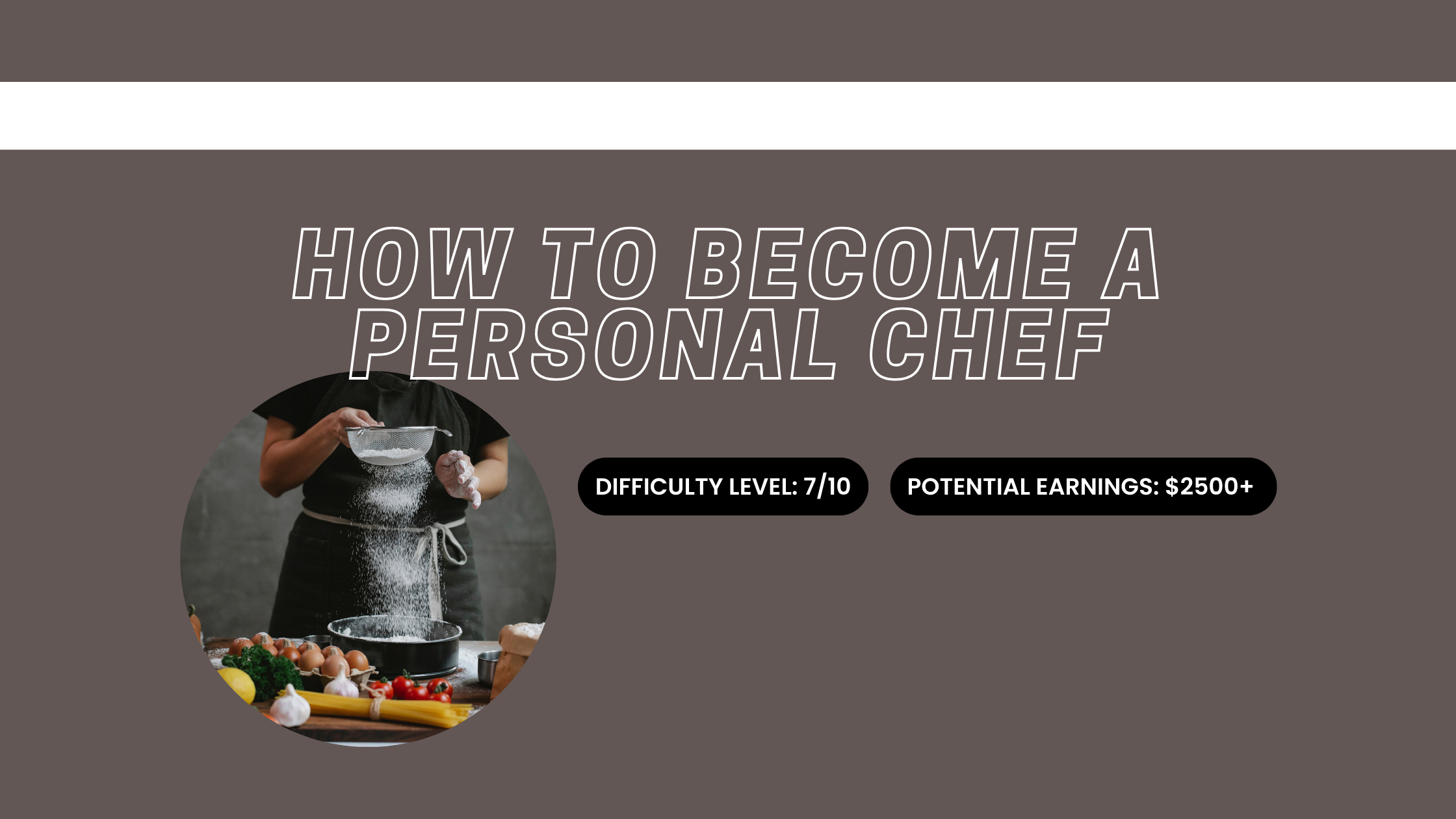How to Become a Personal Chef: Turning Passion into Profit
Time & Money
Difficulty
7/10
Weekly Time Commitment
20-25 hours
Earnings Per Month
$2,500 - $10,000 (depending on clientele and pricing)
Is Becoming a Personal Chef Right for You?
If you’re passionate about cooking, enjoy working closely with clients, and have a knack for customizing meals to fit dietary needs and preferences, this could be the perfect side gig—or even a full-time career. Becoming a personal chef is ideal for creative, detail-oriented individuals who can juggle multiple tasks and thrive under pressure. It’s especially rewarding for those who value building long-term relationships with clients.
That said, this role isn’t for everyone. If managing time effectively or working in other people's kitchens sounds daunting, this might not be the best fit. Flexibility and adaptability are key, as every client has unique tastes, schedules, and dietary goals.
Preparation: The First Steps in How to Become a Personal Chef
The first steps in how to become a personal chef include assessing your culinary skills, building a comprehensive business plan, and gearing up. But most of all, take the first step and get started! No amount of planning will prepare you for getting your hands dirty and learning through the process.
Assess Your Culinary Skills
Test yourself on cooking. Do you feel confident cooking for all palates and dietary restrictions? If not, consider getting a culinary degree or food handling certification.
Develop a Business Plan
Draft your plan for services like weekly meal prep, private dinners, or catering for special events. Find out local health codes and get permits like food handling certifications. And of course your plan should have a clear pricing strategy for your market.
Gear Up
Find reliable tools to cook with, food transport for meals, and other equipment you may need. Such things will prepare you to provide excellent service to your clients from day one.
Execution: The Roadmap to Success
Define Your Niche
Time to pick a niche in a very competitive personal chef market. Do you serve busy families who need weekly meal prep? Offering private dining experiences? Or designing dietary-specific menus like keto, gluten-free, or vegan? Narrowing your focus builds your reputation and retains clients.
Get Legal and Licensed
Get your business legally set up before you start firing up the stove for clients. File for required permits, purchase liability insurance, and learn about local health regulations. This is about more than compliance; it shows professionalism and builds trust with your clients.
Create a Menu and Pricing Structure.
Make the menu reflect your style and audience. Decide if you charge per meal (e.g., weekly meal prep) or per package. Prices should include costs for ingredients and travel. Tailoring your offering to client preferences might also expand your appeal.
Market Your Personal Chef Business
You need an online presence. A professional website with your services, sample menus, and glowing testimonials will make a good first impression. Social media platforms like Instagram are great for showcasing your work; photos of your dishes can get people's attention quickly.
Network and Build Client Relationships
Your personal chef business needs networking. Take part in local food festivals, fairs, and pop-up markets to meet potential clients. Work with event planners, caterers, and fitness coaches to provide service for events, weddings, or corporate gatherings. Relationships will generate repeat business; focus on being customer-focused. Tailor your services to each client and always exceed their expectations.
Invest in Equipment and Tools
Quality tools like knives, pots, and plating essentials are critical. A reliable vehicle for delivering meals or cooking on-site can make all the difference.
Manage Your Time
Tools like Google Calendar and meal prep apps can help you juggle multiple clients. Keeping detailed records of preferences and costs will also streamline your workflow.
Bumps In The Road
Scheduling Conflicts
Managing multiple clients requires careful planning. Use scheduling software to stay on top of bookings, and communicate availability clearly.
Managing Client Expectations
Some clients may have unrealistic expectations. Be upfront about what’s feasible, and ensure pricing and timelines are clear from the start.
Supply Chain Issues
Ingredient shortages may interfere with your plans. Build relationships with suppliers and keep backups of critical ingredients to prevent problems from occurring.
Final Thoughts
It's not all about cooking up juicy recipes. Being a personal chef lets you build a business around your passion. You could have a successful career using your imagination. Focus on quality, relationships, and planning, and the business will build itself. So whether you want to start cooking from scratch or you have the skills but need direction, this path is full of promise for personal growth and fulfillment.
Continue Learning

Personal Shopper
Start a personal shopper business by building a strong online presence and offering tailored shopping services.

Personal Stylist
Become a personal stylist by creating a portfolio, networking with clients, and offering personalized styling services.
